Burned Uniforms and Tossed Luggage: Kabul’s Chaotic Fall
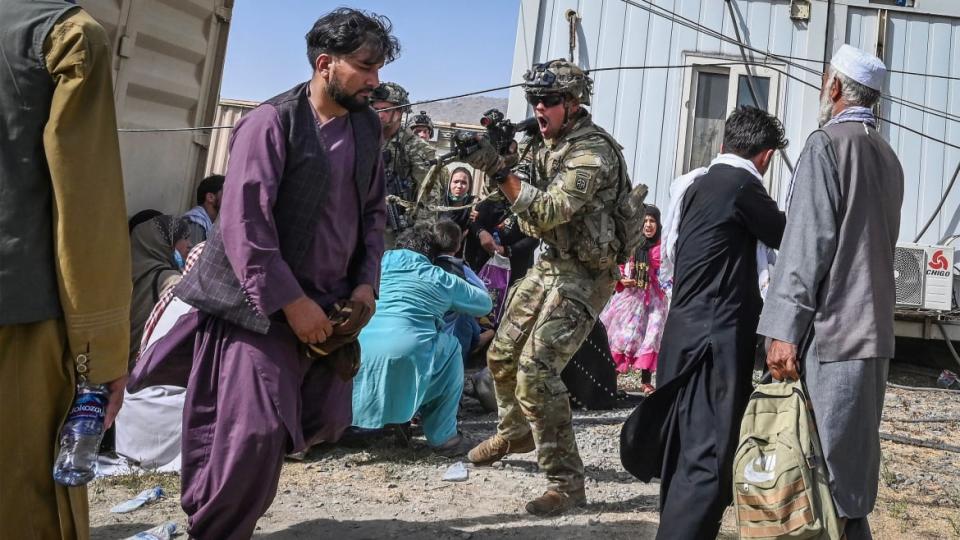
August 15, 2021
PRESIDENTIAL PALACE, KABUL
“Mister President, it is time to leave.” The blunt statement came at 3 p.m. from Hamdullah Mohib, the national security adviser to Ashraf Ghani. The president wanted to grab some personal items and keepsakes, but Mohib told the Afghan leader that nowhere was safe now and time was running out. He could be shot dead on sight by anyone inside the palace walls.
Ghani and Mohib gathered Ghani’s wife, Rula; the senior staff; and several armed bodyguards. Surrounding Ghani and Rula, they moved quickly to the palace helipads, where three Russian-made Mi-17s sat waiting, their rotors already spinning. Mohib led Ghani, Rula, and several others onto the first Mi-17. The rest filled the second. A mortal problem presented itself—there weren’t enough seats on the third chopper.
A scuffle broke out as the bodyguards suddenly played Lord of the Flies. Ghani’s helo took off, quickly followed by the second chopper. Mohib watched as the remaining men pushed and shoved one another, jockeying for position. Finally, the third Mi-17 tried to lift off. There were too many people. As Mohib’s helo made an arcing turnover, he watched as his personal secretary and four of his bodyguards were physically pushed off the Mi-17.
They had been left behind. The first of many to suffer this fate.
When Hasina Safi, the acting Afghan Minister for Women’s Affairs, climbed into her car, her driver-bodyguard went into evasive action.
Kabul’s Evacuation Crisis Has People Falling From the Sky
“What are you doing?” she demanded.
“Taliban are everywhere,” he told her. “We have to get you out of here.”
Hasina steeled herself. “Nonsense. Take me back to the Ministry, right now.”
The half-mile drive to the ministry usually took about seven minutes, but that day it took over ninety minutes to get through the traffic. The sound of gunfire was everywhere, and frightened people swarmed the streets, seeming to run without direction or purpose in their panic.
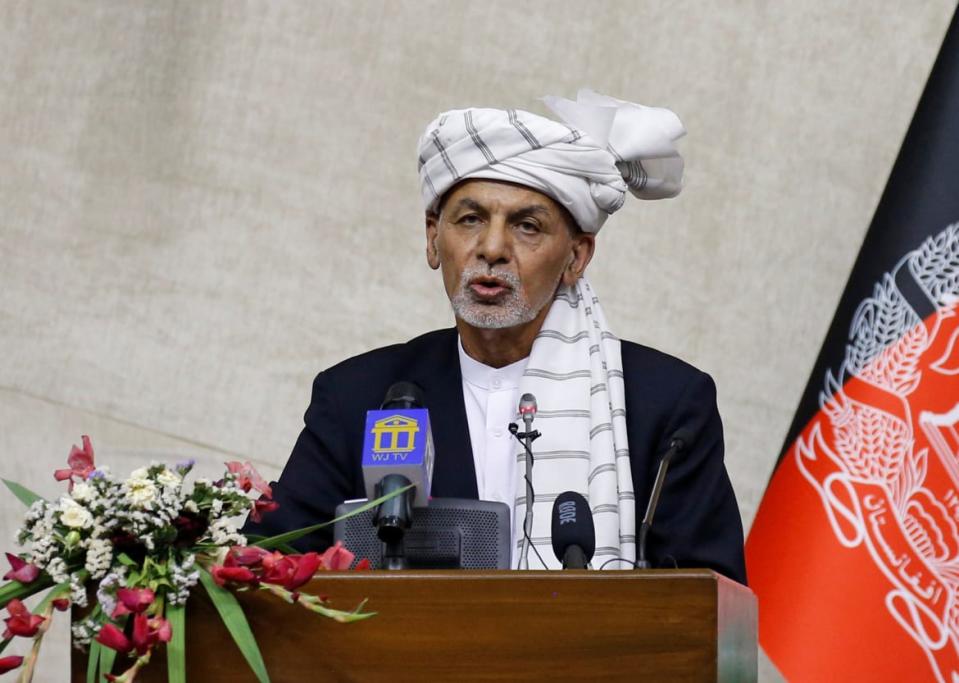
Afghan President Ashraf Ghani speaks at the parliament in Kabul on Aug. 2, 2021.
When they finally arrived at the Ministry of Women’s Affairs building, her heart sank. Only two people had remained, her deputy minister and her human relations director; the rest of the staff had deserted their posts. She didn’t blame them, but she was disappointed. The deputy minister begged Hasina to go home as well, but she was determined to stay, even if the Taliban shot her, beat her, or worse.
MINISTRY OF DEFENSE, KABUL
Master Sergeant Basira Baghrani arrived at her office in the Ministry of Defense as reports flooded in that Taliban were at the outskirts of the capital. Ministry staff swirled around her as they gathered their things before fleeing the compound.
Basira refused to run. “Where are you going? We need to fight. We can hold!” she yelled to her colleagues. But no one listened.
“You need to leave now!” an overweight officer barked at her, clutching an armful of papers as he waddled to a waiting car.
She cursed him audibly, but he paid no attention.
“Get out of here now, Master Sergeant. Save yourself. They’ll be here soon,” he said.
She couldn’t believe it. “Stop running!” she screamed, but there was no stopping the exodus. It was like she was telling them to stay in a burning building.
“And change out of uniform before you leave,” the officer yelled at her over his shoulder. “They’ll kill you on sight in that.”
Rage swelled within Basira. Diminutive and strong with a moon-shaped face framed by her green hijab, she was immensely proud of her uniform and the stature it conveyed. In 2019, she had been the first woman to graduate from the Sergeants Major Academy. Now all that meant nothing. Once the Taliban resumed their rule, she would never again be permitted to wear the uniform.
Her hands began to shake. She took three deep breaths. Then slowly changed her clothes and joined the crowd outside, fighting her way through the throng on the long walk home.
DOWNTOWN KABUL
The traffic had stopped.
Razaq, a longtime interpreter for U.S. Special Forces, sat nervously behind the wheel of his Toyota Corolla, trapped in the gridlocked streets of downtown Kabul.
Full-on panic gripped Kabul. Frightened people packed the sidewalks, running to the already closed banks for their money. Up the street, Razaq could make out abandoned Afghan police vehicles on the side of the road. The cops had stripped off their uniforms and melted into the crowds. The trucks had M240B and .50-caliber heavy machine guns sitting on their mounts. Ammunition belts hung freely from the loaded guns.
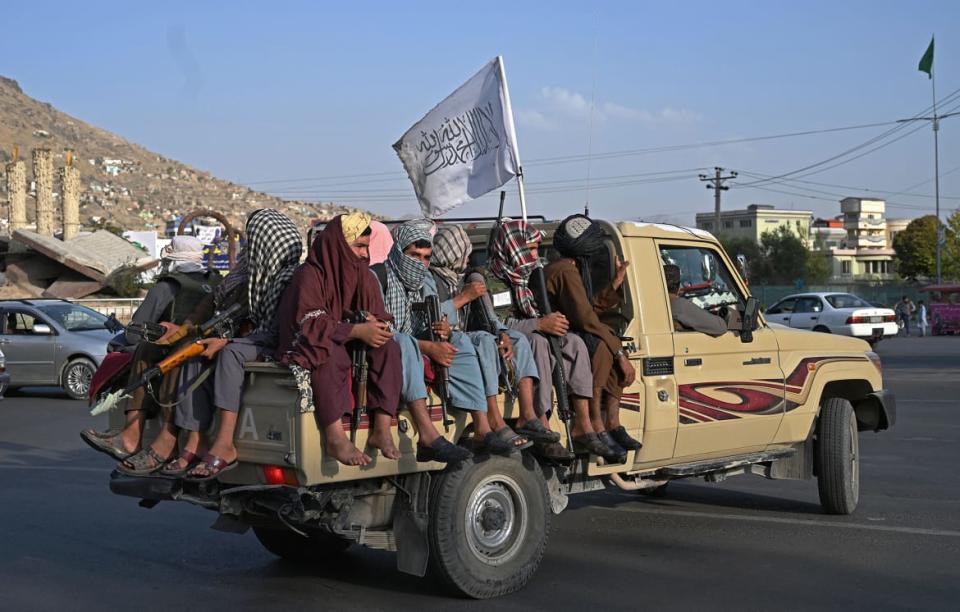
Taliban fighters in a vehicle patrol the streets of Kabul on Aug. 23, 2021.
The situation outside was getting worse by the minute.
The radio was calling out districts inside Kabul that had fallen to the Taliban.
Razaq dialed his wife, Wajmah, who was a kindergarten teacher. “Where are you?” he asked when she picked up.
“I’m at work,” she said.
His mind raced with images of what the Taliban would do to a woman caught working at a school. She was seven months pregnant.
“I need you to go home right now. I’ve got a bad feeling. Lock the door. Take care of the kids. I’ll be home soon.”
He hung up.
His phone rang almost immediately. It was his brother and he answered.
“Where are you, man?” his brother asked.
“I’m in my car, stuck in traffic,” Razaq said.
“Are you crazy? Leave your car and get your ass home, man.”
Razaq heard nearby gunfire. He watched the mayhem through the window of his smoke-filled car. It was like a disaster movie and he wondered if he was dreaming. Then, with one last drag on his cigarette, Razaq opened his door and walked away.
He picked his way through the crowds and blocked streets, always looking back to ensure he wasn’t followed.
As he approached the door to his home, neighbors eyed him suspiciously. “Which one of them will rat me out?” he wondered.
U.S. EMBASSY, KABUL
The loudspeakers of the public address system within the U.S. embassy in Kabul blared, “All personnel to the pickup zone.” Just a few hours earlier, the announcement had come for nonessential personnel to evacuate.
Now it was everybody.
Embassy staff loaded boxes of classified and sensitive records onto a Gator XUV, which then lumbered down the embassy road known as “Pennsylvania Avenue” to a roaring bonfire in a huge roll-off container—a literal dumpster fire. Armfuls of documents were hastily destroyed, while the embassy’s CH-46 choppers buzzed overhead, transporting their colleagues from the Green Zone to the airport two miles away.

A U.S. Chinook military helicopter flies above the US embassy in Kabul on Aug. 15, 2021.
To most, what was happening in real-time was incomprehensible. Just that morning, top embassy staff had held a meeting about the evacuation timeline for the embassy’s chargé d’affaires, Ross Wilson, who was the acting U.S. ambassador. The plan was scrapped almost the moment the meeting ended as small-arms fire rang out through the streets around the embassy.
Security officers rushed through the hallways, going door to door, and ordering everyone out. As the building emptied, the locks were hammered off any doors they couldn’t open, just to make sure no one was left behind.
Embassy personnel donned tan body armor vests and snatched their go-bags. Overhead, helicopters crisscrossed the sky. There was a feeling of urgency as everyone knew in their hearts that soon—probably that very day—the Taliban would be inside the building. The compound, once believed to have been a stronghold of American power, would be just another fallen monument to hubris.
CAMP MOREHEAD, WARDAK PROVINCE
“Have you heard anything, Bashir?” asked the commander of Advanced Operations Base 750, an Afghan Special Forces company still holding out against the Taliban. “It’s getting bad. We’re waiting on orders to get out.”
“They won’t come,” Master Sergeant Bashir Ahmadzai said. “Parwan and Kapisa provinces have fallen.”
“What can we do?” the commander asked.
“Nothing,” Bashir answered.
He stared out the window. Tall and broad with an unruly mop of wavy hair, he was a senior NCO in the Afghan Special Forces, a Q Course graduate, and one of the most trusted Afghan special operators among Green Berets.
Bashir and all the men like him had been abandoned by the Afghan leadership.
Do they think we are made of stone? he wondered.
He was angry. No food. No ammo. No air support. No medevac. These were suicide missions—still, they fought on, plugging hole after hole in a national security dam that was bound to burst.
MINISTRY OF WOMEN'S AFFAIRS, KABUL
Hasina Safi stayed at the Ministry throughout the afternoon, her stomach tightening as she worried about her husband and three children. Her two remaining staff members fed her constant reports of violence throughout the day as the Taliban took control of the capital.
As evening approached, the human relations director warned that the situation had grown exponentially more dangerous. Taliban were lobbing grenades at government sites, with no response from government forces.
Hasina embraced her colleagues tightly and told them both to go home.
Suddenly, her husband called. “Hasina, do not come home. They are looking for you.”
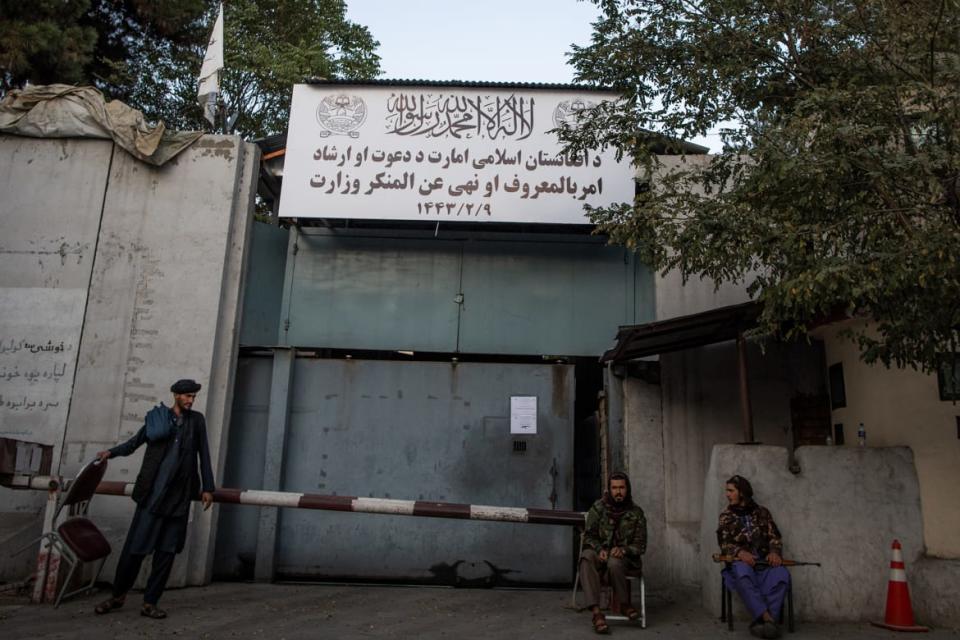
Taliban fighters stand guard at the entrance of the former Ministry of Women’s Affairs which has been replaced with the conservative Ministry of Vice and Virtue, which will oversee the implementation of hardline Islamic rules in Afghanistan.
“Where should I go?” she asked. She worried about her family but knew that she posed a danger to them. Would the Taliban hurt them, too, just because she loved them?
“I don’t know,” her husband said, his voice breaking. “But don’t come here. They’ll kill you.”
She took refuge at the home of a distant cousin, then she anxiously waited.
For what exactly, she wasn’t sure.
U.S. EMBASSY, KABUL
“What the hell is taking so long?” Major Ian Wookey demanded through the helmet mic to his copilot. They had been sitting in the Chinook on the Green Zone soccer field near the U.S. embassy compound with the blades turning for far too long. As the long-rumored evacuation began, they were moving embassy staff to Hamid Karzai International Airport, and their massive twin-rotor chopper was a sitting duck on the grass. Every minute they lingered, the Taliban got closer.
After what seemed like forever, a long line of diplomats and government employees approached single file toward his chopper in the dark. Watching through his night vision goggles, Major Wookey shook his head in disbelief. Some carried three or four massive suitcases. “We’ll never take off with all that shit,” Major Wookey cursed into his mic to his loadmasters, who stood by to guide the civilians up the chopper’s back ramp.
“Let me help carry your bags,” Major Wookey heard the crew chief tell a boarding passenger. Reluctantly, the man agreed and handed him two bags. The crew chief chucked the suitcases off to the side, away from the landing zone.
When they finally took off, the stack of suitcases remained.
KABUL
When Master Sergeant Basira finally arrived home, she found her mother in the back garden feeding the last of her army uniforms into the blazing fire.
“Mother! No!” she said. But it was too late—her mother had tossed the uniform into the fire. Basira screamed as the flames consumed evidence of her achievements, symbols of hope not only for her but for women throughout Afghanistan.
“My child,” her mother said. She leveled a steely gaze on her daughter.

Afghans gather on a roadside near the military part of the airport in Kabul on Aug. 20, 2021, hoping to flee from the country after the Taliban’s military takeover of Afghanistan.
Basira hadn’t seen that look since childhood, just after her father had died. “It is over. We have to live. We have to survive.” She touched Basira’s cheek with her open palm. “I want you to get all of your military certificates and bring them out here and burn them.”
As if in a trance, Basira went to her room. Her certificates hung on the wall. Next to these was a recruiting poster for the ANA with a photo of herself, standing proud. She was semi-famous.
The realization hit her hard. She was a Taliban target now and a danger to her family.
She pulled the certificates from the wall and stuffed them in the bottom of a bag, then piled clothes on top.
Her phone rang. It was a friend from the Ministry of Defense. “Go to the airport. The Americans are evacuating people.”
She hung up in disbelief.
This could only mean one thing: The Americans really were abandoning Afghanistan.
HAMID KARZAI INTERNATIONAL AIRPORT, KABUL
Surrounded by Marines, Ambassador Ross Wilson lowered the American flag at the embassy, folded it, placed it into a canvas sack, then boarded the final helicopter.
From the chopper, everyone could see the desperate gridlock in the streets. Vast tides of desperate people charged the Hamid Karzai airport, the last American foothold in the city. The three-mile trip took only a few minutes, and the helicopters descended onto the southwest end of the Kabul runway.
The CIA officers already on the airfield weren’t expecting an entourage of civilian diplomats in varying states of physical fitness lugging laptops and suitcases, but the foreign service officers zeroed in on an empty building to set up their final base of operations in Afghanistan.
The room was long and contained a pool table and TVs tuned to CNN relaying news in real-time. It had been the CIA’s bar not long ago. The staff set up their workstations on café tables. They plugged in radios and laptops.
Welcome to the new embassy of the United States of America in Kabul.
CAMP MOREHEAD, WARDAK PROVINCE
At 1 p.m., Bashir received a frantic call from a fellow Afghan special operator. “We’ve spotted approximately ten armed Taliban near the ammunition supply point.”
The master sergeant cursed. He grabbed his M4 carbine and ordered the few remaining special operators to mount up.
He and a small band of commandos soon reached the ammo point, where they engaged and killed seven Taliban fighters. They fanned out and killed seven more—including a sniper sequestered high in a tower.
They returned to the headquarters, and Bashir watched as one Army officer after another left the compound in civilian clothes, avoiding eye contact with him and his few loyal commandos. By nightfall, they were the only ones left.
Bashir thought of his family, and of theirs. He gathered his men together. He felt as if he were speaking in slow motion as he issued his final orders at 7:30 p.m.
“Go home. Take care of your families, my brothers. We did our damnedest.”
When the last soldier was gone, he took off his own uniform and shuffled down the road away from the compound one last time. He walked into his modest home and nodded to his wife. She and the kids knew to leave him alone at a moment like this.
HAMID KARZAI INTERNATIONAL AIRPORT, KABUL
First Sergeant Jesse Kennedy could see the fear on the faces of Charlie Company as their C-17 approached Kabul. And for good reason. In just a few minutes, the plane would be on the ground. Their battalion, 2nd Battalion, 504th Parachute Infantry Regiment—known as the White Devils—was part of an airborne armada descending on Kabul. They had no clue what they were flying into or what would greet them once the ramp came down.
The tension showed on the faces of Jesse’s young paratroopers, most of whom had never set foot in Afghanistan. They assumed that they would walk off the tail ramp into a gunfight with Taliban forces occupying the capital.
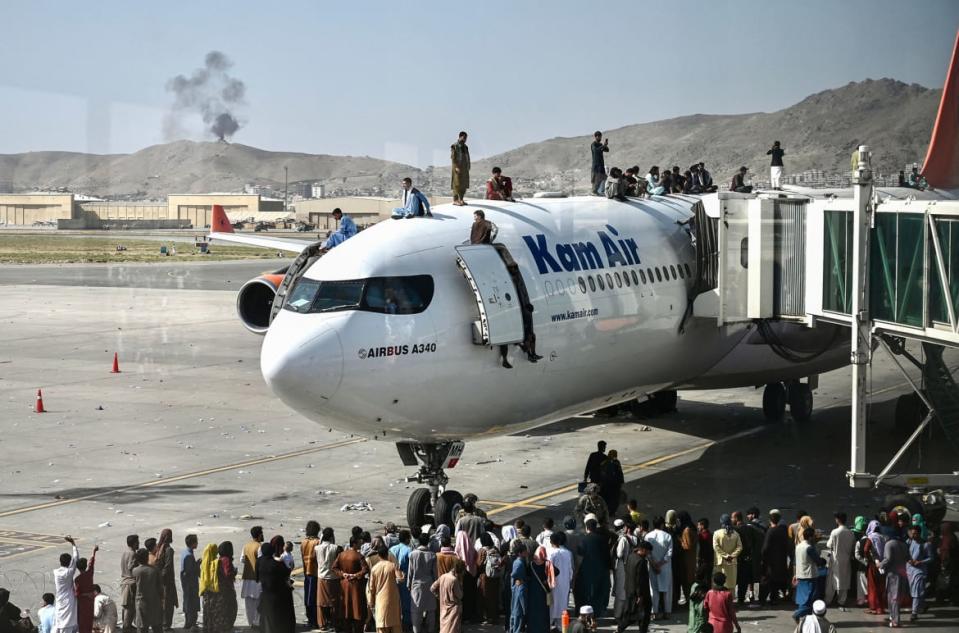
Afghan people climb atop a plane as they wait at the Kabul airport in Kabul on Aug. 16, 2021.
The jumbo jet plunged into its lurching, nosedive descent to avoid potential anti-aircraft fire, Jesse moved through the back of the plane, clapping his guys on the shoulder and cracking jokes. Jesse’s whole body was tensing up, as he imagined how U.S. soldiers felt on D-Day, crouched in their amphibious landing boats just before the ramp went down and spilled the soldiers into a blizzard of bullets. Jesse kept going from soldier to soldier, asking how they were doing. He was nervous, too, but he wouldn’t show it. “Just keep your head, boys. Everything’s gonna be cool.”
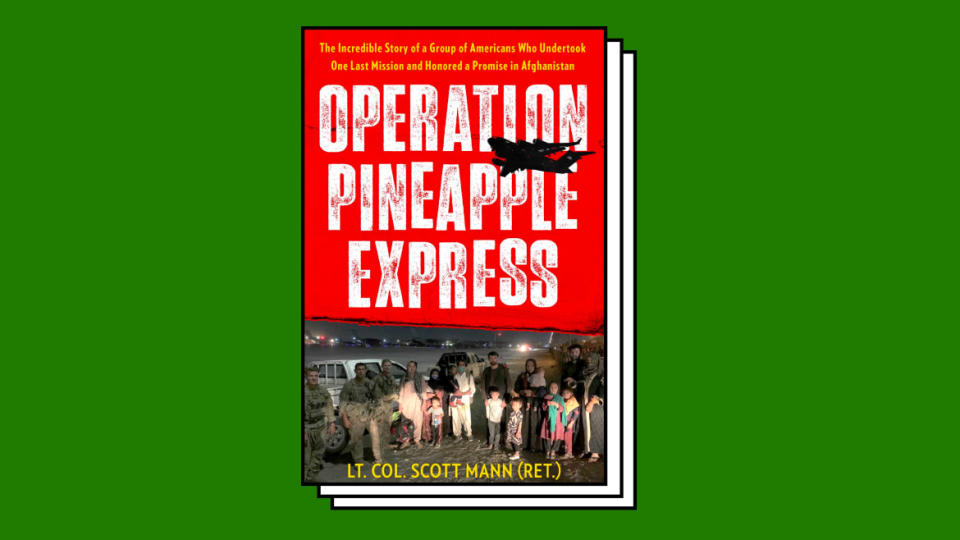
The C-17 landed and taxied to the south end of the runway.
Through the porthole windows, machine-gun fire and tracers lit up the night sky.
Jesse braced himself as the ramp lowered, ready to lead Charlie Company into the unknown.
Adapted from OPERATION PINEAPPLE EXPRESS by Lt. Col. Scott Mann. Copyright © 2022 by Lt. Col. Scott Mann. Reprinted by permission of Simon & Schuster, Inc. All rights reserved.
Get the Daily Beast's biggest scoops and scandals delivered right to your inbox. Sign up now.
Stay informed and gain unlimited access to the Daily Beast's unmatched reporting. Subscribe now.

 Yahoo Movies
Yahoo Movies 